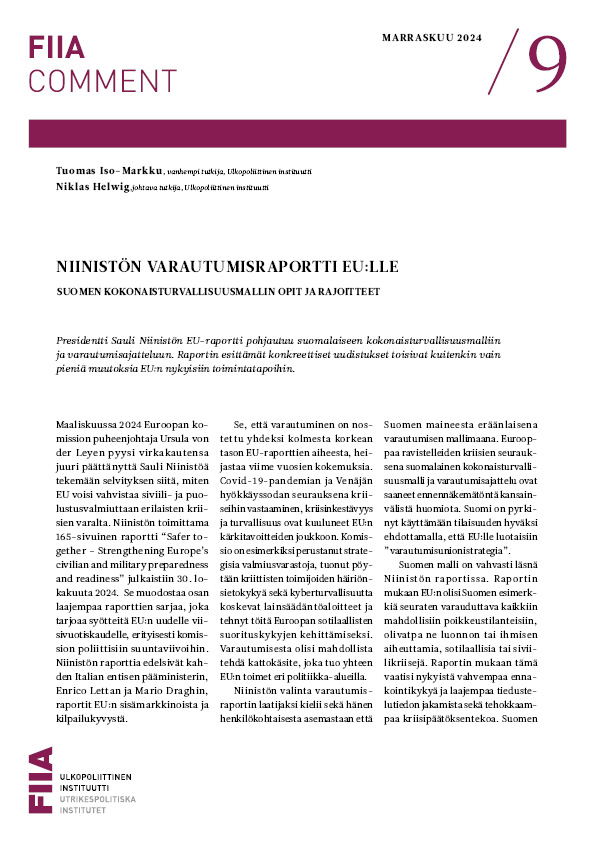The President of Kosovo resigned this week after the Constitutional Court ruled that he had breached the Constitution. This event can be considered as a step towards strengthening rule of law. It is also linked to fierce power struggles and reflects foreign policy tactics just before the Kosovo-Serbia dialogue was due to get underway.
The dialogue that is due to get underway between Pristina and Belgrade is causing strife in the internal politics of Kosovo and serves to highlight the differences between the political parties. Pristina’s stance is clear. The imminent dialogue can only handle practical issues, such as judicial cooperation between the two states, and not the status of Kosovo. PDK, Prime Minister Thaçi’s party, has been more flexible when it comes to finding practical ways to promote cooperation with Belgrade compared to the LDK, the party represented by Fatmir Sejdiu, the President of Kosovo until last week. The LDK has traditionally been keener on respecting principles and legal aspects.
It is interesting that President Sejdiu, who is known to have used legal aspects and principles in his argumentation, was so keen to retain his position as LDK party leader even after he had been elected president in 2006. During recent years, it had become clear that even a “frozen” position as the chair of a party breaches the spirit of the Constitution. However, it was only this summer that some members of the Kosovo Assembly saw fit to take the issue to the Constitutional Court. The latter duly ruled on Friday 24 September that the president was in serious breach of the Constitution, and he subsequently announced his resignation on the following Monday. The Speaker of the Assembly, Jakup Krasniqi (PDK), is now the Acting President of the Republic.
The president’s resignation can be seen as an indicator of the strengthening of rule of law institutions in Kosovo, but as it occurred this late, it is clear that it is also linked to the power struggles of the forthcoming election. PDK won a majority in the last election, but has now been hit by a number of corruption scandals, some of which were investigated by the EU Rule of Law Mission in Kosovo, EULEX. One particularly strong party leader, Fatmir Limaj, who is the current Minister of Transport and Telecommunications, has been under investigation by EULEX. EULEX has executive powers when it comes to high-level corruption and organized crime. Last spring, EULEX police searched both his house and the ministry premises. Minister Limaj has not resigned from his post, however, and the slow pace at which the investigation is proceeding is detracting from the credibility of EULEX prosecutors and the police.
President Sejdiu has not been implicated in any corruption case even though vicious rumours have been circulating around his family. His perplexing desire to hold on to the LDK presidency (without exercising it) despite his position as the President of the Republic can be explained by the internal power struggles within the party. Parties in Kosovo are traditionally hierarchical and the president of the party goes unquestioned as a leader. In this way, Sejdiu was able to guarantee his supporters’ positions of power.
Following the death of Ibrahim Rugova, the first President of Kosovo, a number of leading politicians left the LDK and swore to respect Rugova’s legacy. Subsequently, the younger generation that stayed within the LDK became disenchanted with the internal power circles of President Sejdiu’s supporters, who have not respected the democratic principles of the party. This internal opposition has been supporting Bujar Bukoshi, the former Prime Minister of the 1990’s government in exile, as a candidate for the chairmanship of the party. He also enjoys the support of the Rugova family. Meanwhile, the charismatic son of the late President Rugova, Ukë Rugova, is gaining respect as a young politician.
In the next election, the LDK is hoping to take advantage of the PDK corruption investigations and the problems besetting the opposition party, AAK, which faced a major setback last July as the War Crimes Tribunal in The Hague ordered the re-imprisonment and a partial re-trial of Ramush Haradinaj, the leader of AAK, in a case where he had previously been acquitted.
Did the MPs who complained about President Sejdiu simply want to harm the LDK, or was there something more complicated behind their actions? Sejdiu may, in fact, now hold a stronger position inside his party as he can once again exercise his role as the unquestioned leader of the party, at least until the next Party Convention.
The Assembly of Kosovo has to elect a new president soon, as the Speaker of the Assembly can exercise this function for six months only. Another option would be a new general election, to which the international community seems to have given its blessing if deemed necessary, even though the Central Elections Committee has made it clear that in practical terms this is not feasible before Christmas.
The opposition party, AAK, has called for the election to be postponed until their leader gets back from The Hague. Internally, the LDK now needs to decide who will win, those supporting the principles of the rule of law according to the Rugova legacy, or the current party leaders, who will be unlikely to bring up ethics in their election rhetoric. Amid the internal disarray of the LDK and AAK, an early election would appear to be beneficial only to the current prime minister’s PDK party.
An early election would delay the start of the Kosovo-Serbia dialogue, which has been brokered by the EU in the name of the EU perspective of both countries. In September, pressured by the EU, Serbia finally agreed to start talks on practical issues with Kosovo, for the first time without explicitly bringing up the question of its legitimacy as a state. However, having President Sejdiu sitting at the same table as the representatives of Belgrade would not have been a good election campaign for the current LDK leadership. Albanians were suppressed within Yugoslavia, and even today being invited to the negotiations table would still not be seen as being treated equally – especially as Serbia still refuses to recognize them as representatives of a sovereign state. Postponing the dialogue would be welcome news among the Albanian majority. Both countries have been given an EU perspective, but until all the EU member states recognize Kosovo’s independence, Kosovo will not have access to the enlargement agenda. Thus Pristina has no political interest in merely accelerating Belgrade’s road to the EU.








